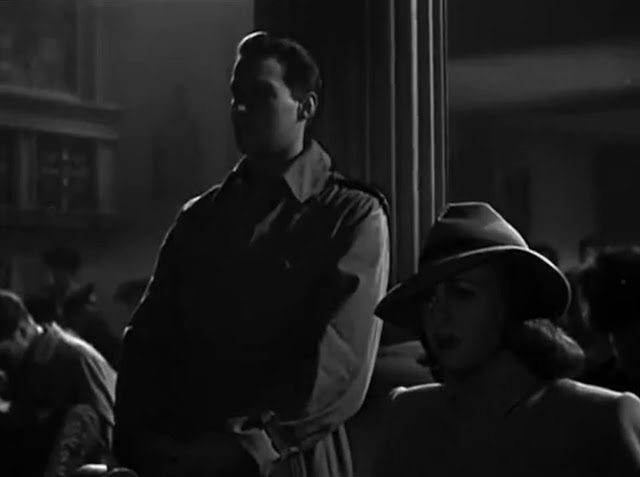There are a few film noirs set during the season, including Christmas
Holiday, They Live By Night, and Mr. Soft Touch.
World War 2 is so important to the film noir style that
emerged in that decade, because it wasn’t all about the great optimism and
patriotism that applied to the drive for victory. There was of course also a
dark, corrupt universe to describe, and it portrayed a cultural dark side, an
underside to the image of goodness.
The whole Christmas genre in fact showed individuals who would
come to value the importance of life, while film noir did the opposite. The
forces of nature, whether they were attraction, compulsion or pure criminality,
always exposed the underside.
Christmas Holiday (1944) has a compelling yet strange narrative structure. It is unusual in that it portrays a story told to an innocent at Christmas time. The hero of the film ― the young soldier who has just graduated from military school, is unceremoniously dumped by his sweetheart, and then by a further twist of fate finds himself stranded in New Orleans ― itself partially representative of America’s own American Nightmares.
Here in New Orleans, this soldier is drawn to a speakeasy by
a seedy character who is part-journalist, part hustler, and meets a hostess
called Jackie who then proceeds in flashback, through the night, to tell her
the awful story of her marriage to the deceitful, charming and yet unbalanced
man of her dreams ― played by Gene Kelly.
Christmas Holiday is both wonderful and unusual. It promises
to be a story of degradation and loss of innocence ― the signals are all there
in the empty and fresh face of Dean Harens. As the young and innocent
lieutenant listens to the story told by Abigail Manette, it almost also becomes
like analysis, the way he listens, draws out a few conclusions. You might
expect in fact, from the start of the film, that we are going to see his
downfall as he is dragged into this mess of murder and love.
The framing is unusual. But recognisable. Deanna Durbin is the star of the film, with no competition at all, and this allows a clean portrayal of all the necessary evils which combine to create film noir.
Look how well she does this. Here she plays the vamp, the femme fatale, the nightclub singer and the sure-fire danger that wants will accrue, in favour of the pure. You can see the discomfort on her face beautifully, and it is a great performance.
 |
Deanna Durbin - doubt in noir. |
 |
Gene Kelly's sole foray into film noir? |
 |
This is a highly teary film noir, thanks to Deanna Durbin's massive grief, regret and remorse. |
 |
Gene Kelly |
 |
Film Noir / Horror / Female Fear, not Paranoia |
 |
These final flowing tears before the end, and a moonlit redemption once more to a state of American grace. |
 |
"The planes are all grounded, the trains won't do you any good, and you're too big for me to carry on piggyback." |
CAST:
Deanna Durbin as Abigail Manette
Gene Kelly as Robert Manette
Richard Whorf as Simon Fenimore
Dean Harens as Charlie Mason
Gladys George as Valerie de Merode
Gale Sondergaard as Mrs. Manette
Christmas Holiday on Wikipedia






